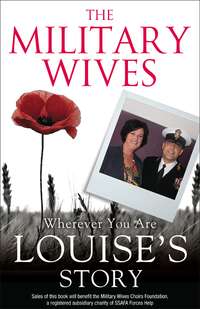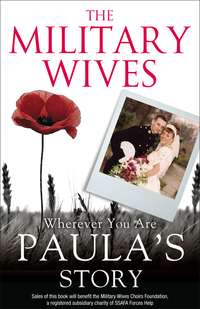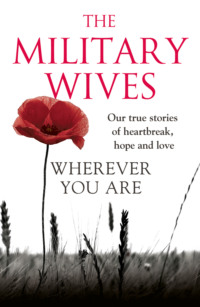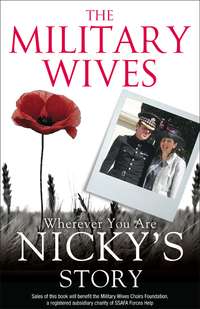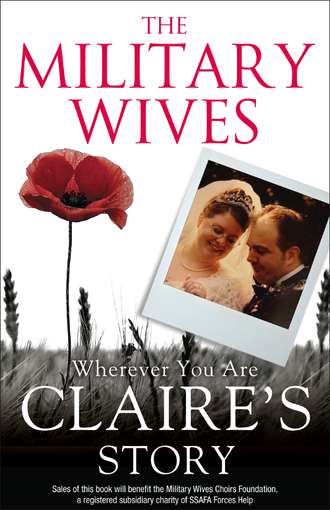
Полная версия
The Military Wives: Wherever You Are – Claire’s Story


Contents
Cover
Title Page
Words We Use
One
Two
Three
Four
Copyright
About the Publisher
WORDS WE USE
We use words and phrases that we pick up from our men – military terms and slang that you may not understand. Here’s an explanation of the ones in this book:
Afghan A shortened version of Afghanistan
Comms Communications, covering everything – phone calls, emails, letters
FOB Forward Operating Base: a secured position away from the main base
R & R Rest and recreation: the break, usually two weeks, the men get in order to come home in the middle of a long tour
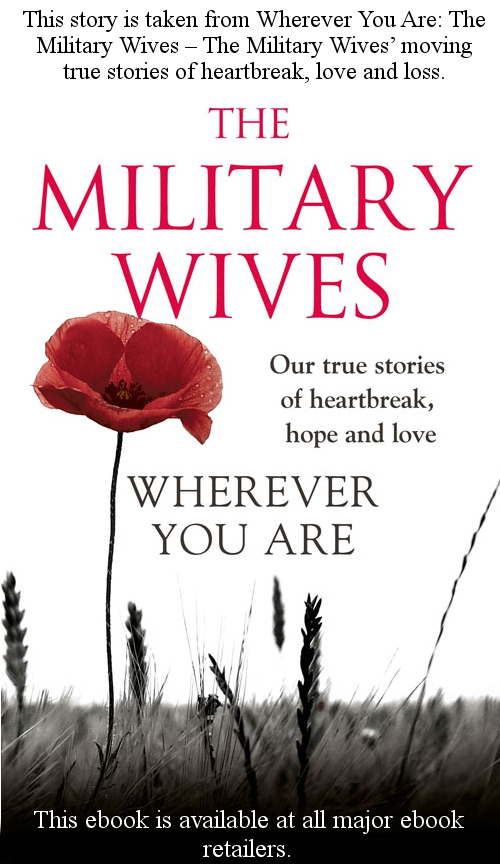
One
I grew up in Gosport and I’m from a military family. Both my mum and dad were in the navy, which made me adamant I wasn’t going to marry a sailor. When you are growing up in a military town there’s a bit of a stigma about the forces, and as far as I was concerned there was no way I wanted anything to do with any of them, even though I was working as a civil servant for the Royal Navy.
When my granddad was treated at the Royal Haslar Hospital (a naval hospital in Gosport which has since closed) he took a shine to one of the young medical assistants, Dave Balneaves, so when Granddad went home I wrote to thank the nurses and I put a separate note in for Dave. I put my phone number on the letter – I don’t know why. He rang me a week later and the rest, as they say, is history.
We got engaged a year after we met, and we married four years later, just a few months after my mum was diagnosed with terminal cancer. She’d had skin cancer, malignant melanoma, seven years earlier, but had been given the all-clear. In April she found a lump, and a year later, after a lot of chemo, she died. My dad had died nine years earlier, so it was a very tough time. While she was ill she wanted me with her and she didn’t want to be in hospital. So for the first months of our married life Dave was in our married quarters and I was living with my mum. Dave was wonderful with Mum, and he supported me through a really bad time. Mum loved him like a son – and she always took his side in everything.
I’m so glad she had the pleasure of seeing me married. We arranged the wedding quite quickly, because we thought Dave might be deployed to Sierra Leone. We’d already experienced a long-distance relationship when we were engaged, when he was based for a time in Chivenor and I was still in Portsmouth, and we didn’t want to do that again. It was a big wedding, with a coachload of Dave’s family from Scotland.
I loved our first quarters, a lovely little flat. Whenever I go back to Gosport I rent one from the navy – you can rent them cheaply, and it’s really nostalgic, like going back to our first home. There were other navy wives living around, but they kept themselves to themselves. I didn’t have time to socialise because I was looking after Mum and going to work, and because it’s my home town I had my own friends.
After Mum died I wanted to start a family, but Dave said we should wait a bit, as he felt I was just trying to replace her. He was right: I needed to grieve. It wasn’t the right time.
When Dave was posted to Gibraltar I jumped at the chance to go with him. They were the best three years of my life. I’d lived there when I was little, when my dad was posted there, but I couldn’t really remember it. My brother, who is four years older than me, came out to visit and we recreated a photo taken when I was about three outside the flat we’d lived in as children.
It was my first real taste of being a military wife, away from all my old friends. I had a job, in a building society, but our social life was with the other military people. Because we had no children we tended to mix with single people: Dave would cover the shifts of girls in the hospital so that I could go out with them. It was all fantastic.
There was one big worry: we’d started trying to have a baby when we moved to Gibraltar, and it wasn’t happening. The navy flew us back for tests in London, and we were told it was ‘unexplained infertility’.
On the one hand that feels quite good: there’s no obvious reason, so there’s still some hope. On the other hand, if there was a reason, they might be able to do something. I needed a small gynaecological operation, but there was an 18-month waiting list and we knew we would be back in the UK by then. So we stopped worrying and relaxed.
When we came back we moved to this house in Chivenor, where we’ve lived for more than five years. It wasn’t easy, as life on a patch like this is all about children and we didn’t have any. I kept myself to myself and looked for work, eventually finding a civil service job on camp. It was a casual job, covering the time the army lads from Chivenor were in Afghan, and as Dave was going too it was good for me to be busy.
I was doing the paperwork for the sick and injured who came back to the UK, and I made it more of a job than it was, going with the families up to the hospital at Selly Oak, sorting out any problems they had. It felt good to be helping them out. I also got involved in organising family events at Chivenor for the families of those who were away.
Dave had been away before, to Iraq, but then he had stayed on a ship. This time, in Afghanistan, he was on the front line, and I didn’t hear from him for six or seven weeks. Even after that, he was in an FOB with very bad comms. But he knew he didn’t have to worry about me: I’ve always been strong and independent.
Конец ознакомительного фрагмента.
Текст предоставлен ООО «ЛитРес».
Прочитайте эту книгу целиком, купив полную легальную версию на ЛитРес.
Безопасно оплатить книгу можно банковской картой Visa, MasterCard, Maestro, со счета мобильного телефона, с платежного терминала, в салоне МТС или Связной, через PayPal, WebMoney, Яндекс.Деньги, QIWI Кошелек, бонусными картами или другим удобным Вам способом.


